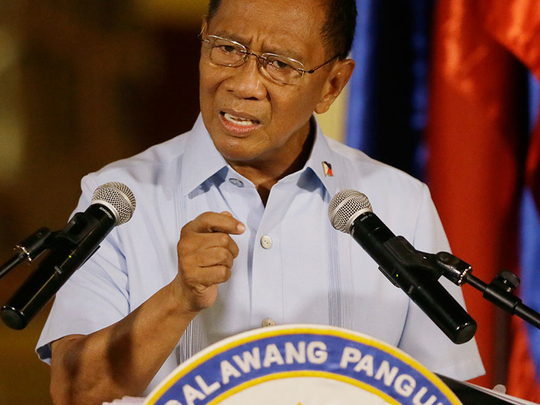
Manila: The resignation of Vice-President Jejomar Binay from two cabinet posts has galvanised the opposition and signalled the start of hard criticism against President Benigno Aquino that could damage the chances of the ruling party’s presidential candidate in 2016, now a choice between Transportation Secretary Mar Roxas and Senator Grace Poe, sources said.
“Vice-President Binay can now lead the opposition independently,” said Congressman Lito Atienza of Buhay, a sectoral party at the House of Representatives.
“There hadn’t been a leader to rally and galvanise the opposition against this [allegedly] corrupt and incompetent president,” said Rigoberto Tiglao, a columnist of Manila Times.
“The vice-president voiced out the sentiments of poor Filipinos and criticised few allies, friends, relatives and supporters of the president for allegedly benefiting from the inclusive economic growth being bragged about by the administration,” said Congressman Jonathan de la Cruz of Abakada, also a sector party.
Binay’s tirade on Aquino’s alleged callousness and failure as administrator could spark a long list of alleged presidential misdemeanours, said political analyst Prospero de Vera.
Critics have started talking again about Aquino’s alleged tactics to please voters when he created the Disbursement Acceleration Plan (DAP) to siphon funds coming from savings of line agencies, with a presidential decree in 2011. DAP funds were given instead to congressmen and senators in late 2012, months after the two houses of Congress impeached former Chief Justice Renato Corona in mid 2012. The Supreme Court ruled that the DAP was unconstitutional in 2014.
Binay’s claim of being a victim of “selective justice” revived complaints that Aquino’s allies have not been charged with alleged misuse of development funds. Just three opposition senators were imprisoned for this crime even if the whistle-blowers’ list indicted almost 80 per cent of lawmakers in both houses of Congress.
“A foreign ambassador protested an extortion try by government officials” over proposed services for Metro Manila’s elevated train system, said Tiglao. Roxas never disclosed and punished the people behind the alleged corruption.
The massacre of 44 elite police troops who were led by a suspended police chief in a mission to get a Malaysian terrorist in Maguindanao, southern Philippines, in late January was never fully investigated.
China’s takeover of Scarborough Shoal, 198 kilometres west of Subic Bay, central Luzon, after a standoff between Chinese and Philippine vessels in 2012 was never revealed as the country’s mismanaged foreign affairs policy. The shoal is within the exclusive economic zone of the Philippines in the South China Sea.
Tiglao also mentioned Bureau of Internal Revenue’s (BIR) “refusal to touch a billion peso tax case of an Aquino sympathiser”. Details were not given.
In defence, Justice Secretary Leila de Lima promised that charges of alleged corruption are being prepared against Aquno’s allies. Congressman Rodolfo Albano unwittingly admitted that Aquino’s cabinet members and not the president were failed administrators. He underlined the alleged weakness of Roxas and de Lima, a senatorial aspirant in 2015.
If Binay and Roxas face each other in the 2016 presidential race, at will be a rematch of their vice-presidential race that Roxas lost in 2010.











